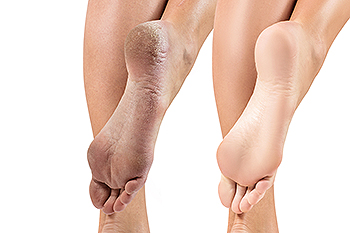
Cracked heels is a foot condition that is more common than many people think. It can happen for various reasons, such as wearing shoes that do not fit correctly and drinking inadequate amounts of water daily. Walking barefoot, in addition to frequently wearing flip-flops or other open-back shoes, may also lead to developing cracked heels. Existing medical conditions, consisting of diabetes, psoriasis, or athlete’s foot, may lead to getting this condition. Obesity may be a reason cracked heels can develop, which can be a result of added weight the body must bear. This is also true of pregnancy, causing cracked heels and swollen feet to happen. Research has shown there may be nutritional deficiencies that can cause this uncomfortable condition, including calcium, iron, and vitamin E. Mild relief may be found when the feet are soaked in warm water, followed by applying a good moisturizer. If you would like additional relief options for cracked heels, it is suggested that you confer with a podiatrist who can answer any questions you may have.
If the skin on your feet starts to crack, you may want to see a podiatrist to find treatment. If you have any concerns, contact Bruce Smit, DPM from Frankfort Foot & Ankle Clinic. Our doctor can provide the care you need to keep you pain-free and on your feet.
Cracked Heels
It is important to moisturize your cracked heels in order to prevent pain, bleeding, and infection. The reason cracked heels form is because the skin on the foot is too dry to support the immense pressure placed on them. When the foot expands, the dry skin on the foot begins to split.
Ways to Help Heal Them
Ways to Prevent Cracked Heels
If you are unsure how to proceed in treating cracked heels, seek guidance from a podiatrist. Your doctor will help you with any questions or information you may need.
If you have any questions, please feel free to contact our office located in Frankfort, IL . We offer the newest diagnostic and treatment technologies for all your foot care needs.